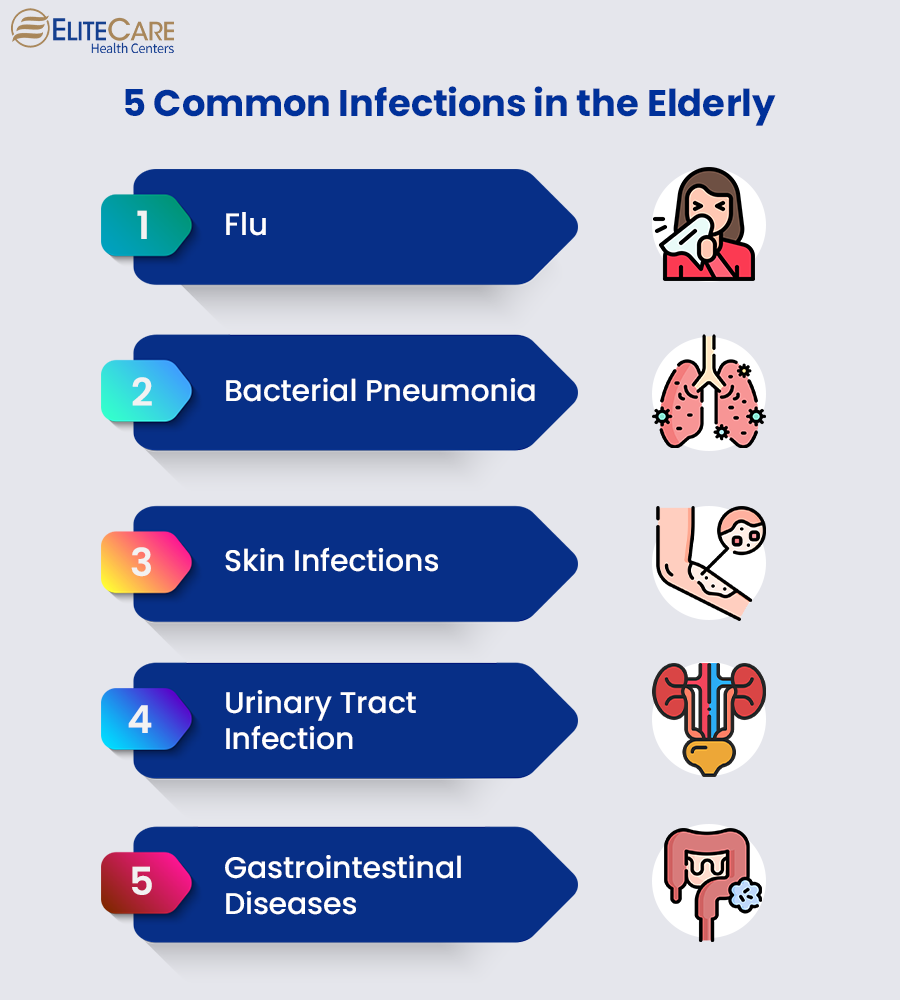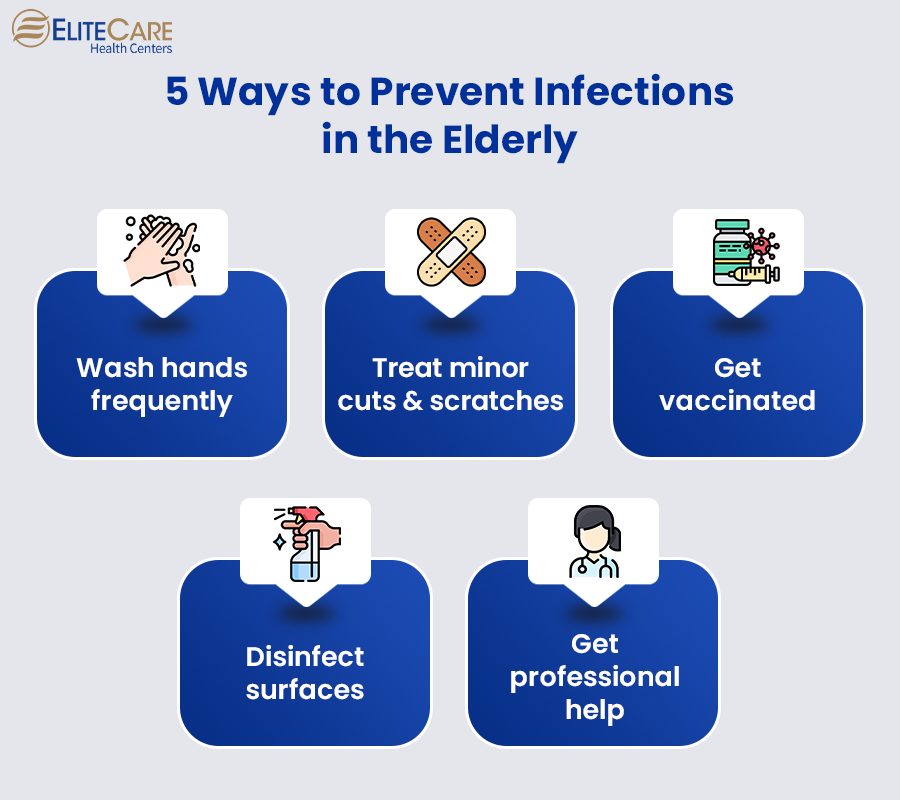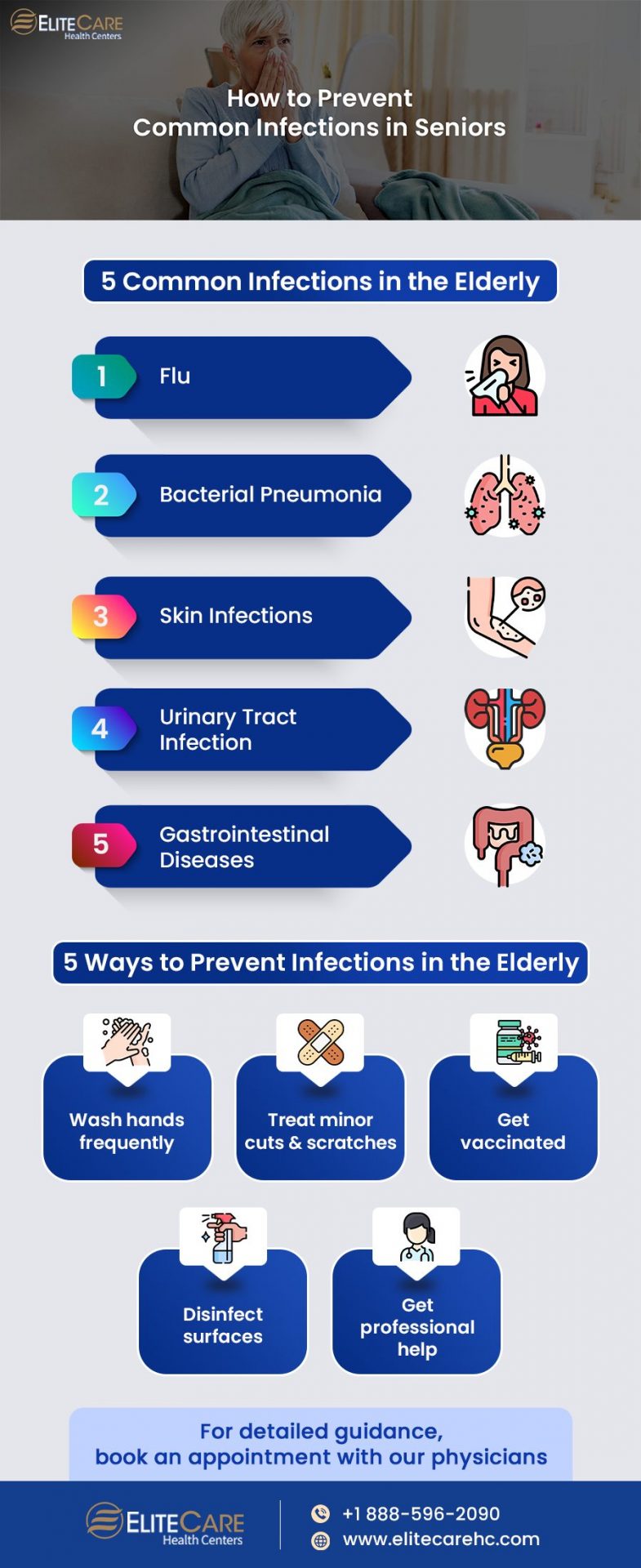
When people age, the antibodies in their body begin to decline. As a result, they become more prone to various diseases and infections.
According to research, one-third of all deaths among people aged 65 and above are caused by infectious diseases. Considering preventive care is the best way to keep seniors safe from these infections and diseases. Therefore, it is crucial to understand and be aware of the common infections that affect seniors and how to prevent them.
Why are infections more common in seniors?
Seniors often suffer from comorbid illnesses like diabetes, renal failure, and arthritis. Hence, Immunosenescence, or a decreased ability of the immune system to function, is expected as people age.
Read More: Do’s & Don’ts for a Fasting Sugar Blood Test
When a person becomes weak, their body mass index decreases, and they struggle to carry out their daily tasks easily and independently. They also become more vulnerable to injury from falls. Having comorbid illnesses, low immunity, and frailty are all factors that contribute to greater risk of infections among seniors.
Read More: How to prevent seniors from falling?
Another key issue that aggravates infections in seniors is the lack of classic symptoms like a fever when contracting an infection. Fever often develops in seniors only after the infection has worsened. Patients may instead exhibit symptoms like confusion, delirium, anorexia, falls, or a general decline in functional ability making it difficult for the caretaker to diagnose it.
5 Common Infections in the Elderly

1. Influenza (Flu)
The flu is a seasonal virus that infects the respiratory system and can lead to pneumonia if left untreated.
The virus spreads through microscopic droplets from coughing, sneezing, or even talking and is contagious. Everyone can get the flu, but seniors 65 and older are at a higher risk of complications and hospitalization due to reduced immunity.
2. Bacterial Pneumonia
3. Skin Infections
Adults over 65 are more likely to have skin infections, as with age the skin loses its integrity due to inadequate nutrition, obesity, poor immunity, and skin thinning.
Here are few common skin infections in the elderly:
- Methicillin-resistant Staphylococcus aureus (MRSA)
- Drug-resistant infections or cellulitis
- Viral illnesses like herpes zoster
- Foot infections
4. Urinary tract Infection or UTI
UTIs (urinary tract infections) are infections of the urinary tract, which include the kidneys, ureters, bladders, and urethra, caused by bacteria or fungi. Bacteria that enter the urethra and go to the kidneys or bladder cause UTIs.
UTIs are more common in those with medical disorders prevalent in older adults, such as diabetes, catheter use, incontinence, immobility, or kidney stones. Seniors are more prone to dehydration, which can lead to more UTIs on average. Additionally, menopausal women are more susceptible to UTIs.
5. Gastrointestinal (GI) infections
GI infections are caused by bacteria, viruses, or parasites entering the GI tract causing diarrhea, nausea, and vomiting. Most GI infections go away on their own, but some might develop into more serious problems.
Foodborne illnesses, which can be caught by consuming contaminated food or drink, are the main cause of GI infections.
How to Prevent Infections in the Elderly

To prevent infection, there are multiple ways one can consider. However, the following general recommendations will help seniors stay safe when dealing with infections.
Hand washing
Infection control requires more emphasis on maintaining hygiene. The best way to prevent the spread of sickness and infection is by washing your hands frequently. The Centers for Disease Control (CDC) states that handwashing is the most efficient strategy to prevent the spread of infection and disease. Check out the five-step handwashing procedure from CDC to stay healthy.
Read More: Importance of Hand Hygiene for Seniors
Clean and cover all cuts, scratches
Every cut, scratch, or lesion should be cleaned and covered. Seniors with a compromised immune system are more susceptible to infection from even minor cuts or scrapes. Check the lesions frequently, and if their condition worsens or redness or swelling appears, get medical attention.
Vaccinations
While many adults believe they do not need immunizations or are concerned about the vaccine’s adverse effects, people aged 65 and older are at greater risk of developing complications from various infections. Vaccines can aid in preventing or even reducing the effects of the flu, pneumonia, shingles, and several other serious illnesses.
Read More: 6 Facts You Must Know about the Flu Vaccine
Cleanse the surfaces.
Clean surfaces in the senior care spaces regularly with an antibacterial solution. Infection-causing causes are particularly likely to be found on hard, flat surfaces. Other common touch points should also be cleaned off because they could be infection-prone locations.
Get professional help
Any specialized medical procedure that carries an elevated risk of infection, should be handled by an expert. For instance, tending to open wounds, inserting a catheter, or cleaning the area around implanted ports. Ask a home healthcare provider for assistance with the procedure.
Conclusion
Treating infections in older adults requires special attention. It is critical to understand their needs and look out for minute symptoms or changes in their condition to detect any infection or illness early on. More importantly, focus on preventing infection in seniors by following the recommendations we have provided in this blog post.
Contact our EliteCare Health Centers team of health and wellness specialists for advice on preventing infections and vaccinations. Schedule an appointment.






